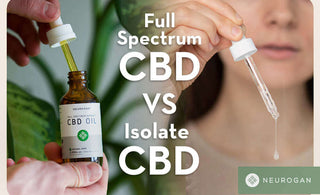Full spectrum CBD is a type of hemp product that contains a full range of cannabinoids, terpenes, and other compounds naturally found in the cannabis plant, including trace amounts of THC (under 0.3% in hemp-based products). This combination produces an entourage effect, where the compounds work synergistically, potentially enhancing effects.
CBD isolate is a pure form of a single cannabinoid, typically 99% or higher in purity, with CBD being the most common type of isolate.
It lacks other cannabinoids, terpenes, and plant compounds, which results in a more controlled effect without the entourage effect, suitable for those wanting to avoid THC entirely or seeking precise dosing of CBD.
Benefit Comparison CBD Isolate Vs. Full Spectrum
The benefits of full-spectrum CBD and CBD isolate differ mainly due to the presence (or absence) of various cannabinoids and plant compounds.

Full-Spectrum CBD
- Entourage Effect: Full spectrum CBD is believed to produce an "entourage effect," where the mix of cannabinoids, terpenes, and flavonoids works synergistically to strengthen and balance the overall effects of the main cannabinoid, CBD.
- Broad Wellness Range: The presence of multiple cannabinoids may offer a broader range of benefits, supporting relaxation, clarity, and a general sense of calm.
- Less Processed: Full spectrum extracts typically undergo less processing, preserving more of the plant's natural compounds.

CBD Isolate
- No THC: CBD isolate contains no THC, making it ideal for individuals who want to avoid THC entirely, whether for personal, legal, or professional reasons.
- Precise Dosing: With a nearly pure form of CBD, isolate allows for more controlled and specific dosing, which can be helpful in clinical or high-dosage settings.
- Fewer Potential Allergens: Since it lacks terpenes and other compounds, CBD isolate may have a lower risk of causing allergic reactions or sensitivities, making it a safer option for some users.
In general, full spectrum CBD may be better suited for those seeking comprehensive wellness benefits and are comfortable with trace amounts of THC. At the same time, CBD isolate is preferred by those needing purity and precision without the risk of THC exposure.
Is Full Spectrum or Isolate Cheaper?
CBD isolate is typically cheaper than full spectrum CBD. This is because CBD isolate requires fewer extraction and refinement steps and doesn’t require the careful preserving the full plant profile.
Full spectrum CBD, on the other hand, retains a broader range of cannabinoids, terpenes, and flavonoids, which require more complex extraction and preservation techniques to maintain their balance and potency.
On top of this, because of the entourage effect, full spectrum CBD is often viewed as more effective for a range of wellness uses, which can also drive up its price in the marketplace.
How Are They Made?
CBD isolate and full spectrum CBD are created through distinct extraction and refinement processes designed to separate or preserve specific plant compounds.

Extraction
The most common methods of extraction for full spectrum CBD are CO2 extraction or ethanol extraction. These methods help to preserve the full spectrum of cannabinoids and terpenes by pulling out all compounds from the cannabis plant without leaving traces of harmful solvents behind in the finished product.
CBD isolate actually undergoes the same initial extraction process as full spectrum CBD with CO2 extraction and ethanol extraction being the popular methods.
However, after this initial process, CBD isolate undergoes an additional process, called winterization and distillation, to remove plant waxes, fats, and other unwanted materials. The winterization process involves freezing the extract with ethanol to separate these elements.

Refinement
After the extraction process for full spectrum CBD, the crude extract undergoes minimal processing to remove impurities like chlorophyll or plant waxes, but it retains most of the cannabinoids, including THC (in hemp products, this is usually under 0.3%).
After the distillation step for CBD isolate, further processing, such as chromatography, isolates the CBD from other cannabinoids and compounds. The end result is a 99% pure CBD powder.
Testing and Formulation
Both full spectrum and CBD isolate are tested for purity and potency before being formulated into various products.
CBD Oil: Full Spectrum vs Isolate
When it comes to CBD oil, the primary difference between full spectrum and isolate lies in the compounds each one contains and the potential effects they offer.
Full-spectrum CBD oil includes a variety of cannabinoids (such as CBD, THC, CBG, and CBC), terpenes, and flavonoids naturally found in the cannabis plant. Hemp-derived full spectrum CBD oils typically contain less than 0.3% THC.
As we mentioned, the entourage effect may amplify the effects of a full spectrum product compared to a broad spectrum or isolate product. You can expect all of the effects that we recognize CBD offers, like relaxation and relief support, but with the potential for those effects to feel enhanced. Some people find that a 25 mg dose of full spectrum CBD products feels much stronger than a 25 mg dose of CBD isolate.
Due to the entourage effect, full spectrum CBD is often preferred for people seeking a comprehensive wellness boost.
CBD isolate oil is made from nearly pure CBD (typically 99% or higher), with no other cannabinoids, terpenes, or THC. This purity is achieved through additional processing to remove everything except CBD. Because it lacks other cannabinoids and terpenes, CBD isolate does not produce the entourage effect. The effects are generally more subtle and are limited to CBD alone, though it can still offer benefits like calming, anti-inflammatory, and anti-anxiety effects.
CBD isolate oil is often chosen by those who want to avoid any THC (even trace amounts) or those who need precise, controlled dosing without other compounds interacting with the CBD.
Should I Pick Full Spectrum CBD vs Isolate CBD?
Choosing between full spectrum CBD and CBD isolate depends on your preferences.
We tend to favor and recommend full spectrum CBD. While its cost may be higher than CBD isolate, the potential benefits easily make the cost worth it. Many users turn toward a CBD regimen when seeking holistic wellness support and full spectrum CBD offers more effects that align with wellness goals.
If you truly want a zero-THC CBD regimen, then CBD isolate is still a great choice and offers beneficial effects, but you can also opt for a broad spectrum CBD product, which still maintains a range of cannabinoids but have zero traces of THC. It’s like a happy medium between these two options.

